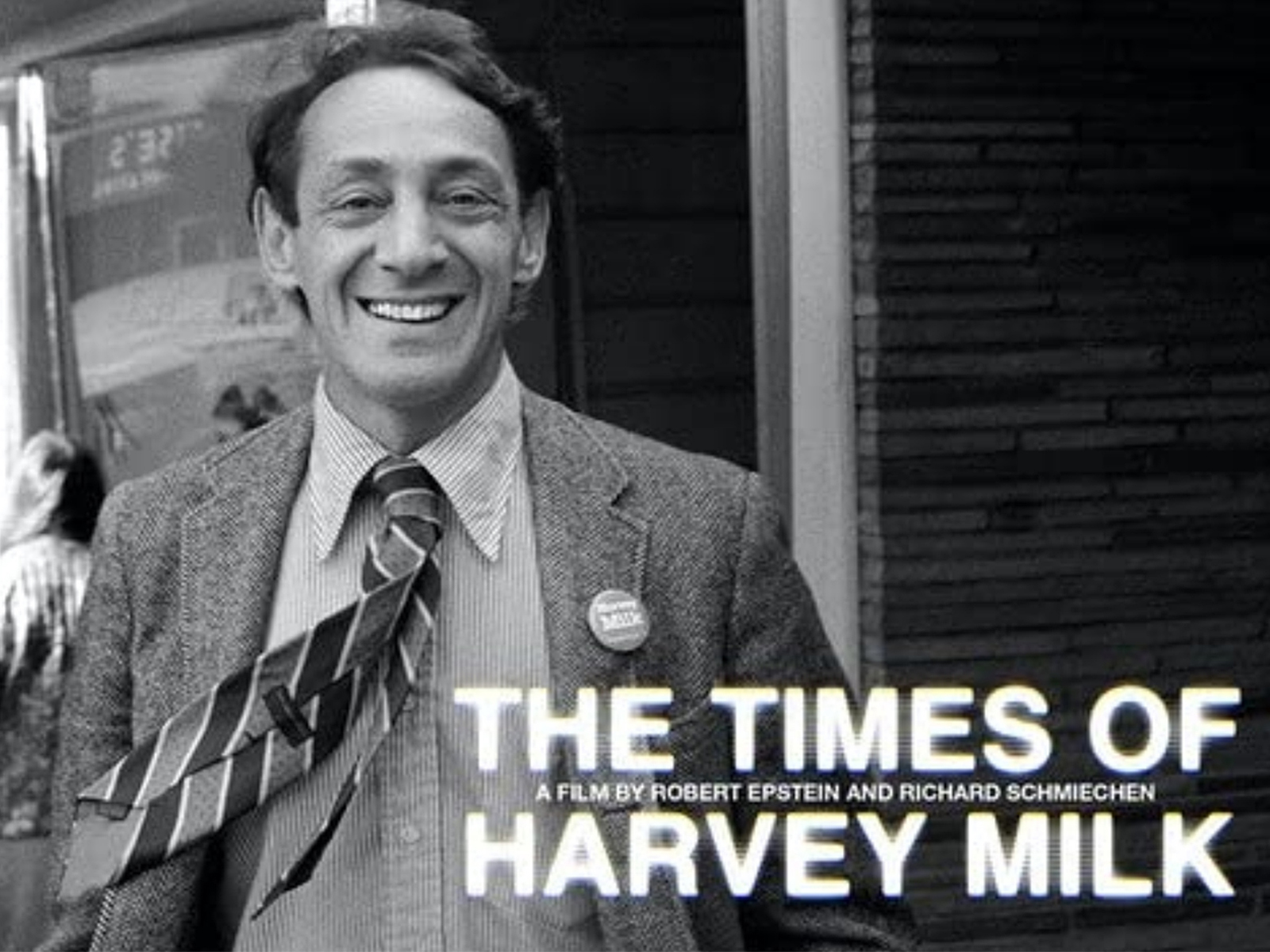
- Film
Docs: The Times of Harvey Milk (1984)
Though better known, Gus Van Sant’s 2008 Golden Globe and Oscar winning biopic, Milk, starring Sean Penn, was not the first feature about the gay pioneering politician Harvey Milk, or about the socio-political era in which he rose to power as the first openly gay man elected to office.
In 1984, Robert Epstein and Bob Friedman made the The Times of Harvey Milk, a feature, which, among other things, prepared the background for other features about AIDS, such as Parting Glances (1986) Longtime Companion (1990), and Poison (1991), to mention just a few titles.
World premiering at the prestigious 1984 Telluride Film Festival, and shown at the New York Film Festival, the documentary received a major gala on November 1, 1984, at The Castro Theatre in San Francisco (in the heart of the gay neighborhood and just feet away from Milk’s photo shop).
Following the classic structure of a rise-and-fall biopic, the text chronicles the rise to political power and then the tragic murder of Milk, in 1978. Milk’s personal-political story paralleled that of the then nascent gay rights movement, specifically after the Stonewall riots in New York, in June 1969.
It depicts the heady times of the 1970s in San Francisco’s Castro district, home of the world’s most famous and most organized gay community. In a sense, that community couldn’t ask for a more potent representative and mobilizing symbol than Milk.
The movie shows how, unsuccessful in his first attempts at a City Supervisor seat, Milk eventually won the elections, after the city restructured the zoning of its districts.
Milk’s campaigns are related by former campaign aides, who tell of his generosity and insistence on maintaining a diverse staff, which included gays, lesbians, and some straight volunteers.
In one of the film’s exhilarating scenes, we observe Milk, and his supporters react to his unexpected triumph with both disbelief and unmitigated joy.
Considering the very short time he served in office (about 11 months), he managed to accomplish quite a bit, sponsoring a bill that banned discrimination in public accommodations, housing, and employment due to sexual orientation; the bill was passed by a vote of 11-1 supervisors, and then signed into law by Mayor Moscone.
The tragedy that followed was foreshadowed by Dan White, the fellow San Francisco Supervisor who murdered Milk and Mayor George Moscone. Despite White’s confession and evidence of intent, he was given a minor sentence of only seven years in prison.
As a result, San Francisco’s gay community was catapulted into a state of rage that led to one of the biggest riots in American history, held at City Hall. The scene of the candlelight march held for Milk after his murder is especially poignant, striking a relevant note to our very present times. Organizers of the Black Lives Matter movement have referenced that demonstration as a key event and model for their own protests.
The film is narrated by actor and playwright Harvey Fierstein (Torch Song Trilogy, La Cage Aux Folles), with an original score composed by Mark Isham.
Among the prominent figures interviewed are Anne Kronenberg (city hall aide to Harvey Milk), Tory Hartmann (political consultant), Tom Ammiano (schoolteacher, who would become a member of the California State Assembly), Jim Elliot (auto machinist), Henry Der (executive director, Chinese for Affirmative Action), Jeannine Yeomans (TV reporter), Bill Kraus (gay activist), and Sally M. Gearhart (speech professor).
Other politicians include San Francisco mayor George Moscone (who was assassinated with Milk), and Moscone’s successor and now U.S. Senator Dianne Feinstein appear in archival footage. The film opens with a tearful Feinstein announcing to the media that Moscone and Milk had been assassinated by Dan White.
The film was produced after Milk’s death using original interviews, exclusive documentary footage, news reports, and archival footage. The tone is rather complex, a mixture of sad tragedy as well as warm nostalgia for a unique period in American gay history.
Not only did it win the Best Documentary Oscar Feature in 1985, it was also awarded the Special Jury Prize at the very first Sundance Film Festival.
A digitally restored version of the film was released on DVD and Blu-ray by the Criterion Collection in 2011, featuring interviews with director Rob Epstein, co-editor Deborah Hoffmann, photographer Daniel Nicoletta; news clips not used in the film; talks with Milk’s friends Cleve Jones, Anne Kronenberg, and Nicoletta; rare collection of audio and video recordings of Milk; excerpts from Epstein’s interviews with Milk’s partner Scott Smith; and a 2003 panel discussion with Dan White’s attorneys.
In 2012, this film was deemed “culturally, historically, or aesthetically significant” by the U.S. Library of Congress and selected for preservation in the National Film Registry. At once an invaluable piece of history, and a tribute to a towering figure in the gay rights movement, The Times of Harvey Milk is a must-see documentary.

